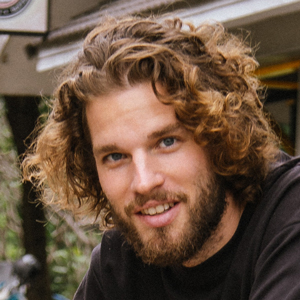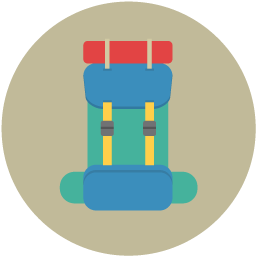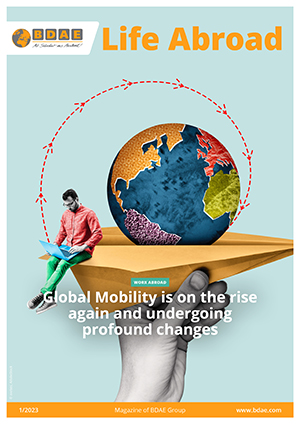"When I travel, I get to try out new versions of myself."
As a digital solopreneur, Jannik Voß has had the chance to live and work in various countries around the world.
Throughout our interview, he touched on what solopreneurship means, why cultural identities are overrated, and why he would argue for a general obligation to travel. He also reveals why a spiritual approach to business is helpful and whether he could imagine returning to Germany.
What was the initial spark for your decision to leave Hamburg and go to Bali? Why did you decide on Bali?
Jannik: My desire to work 100% remotely started in 2015 when I studied in Bali for two semesters. After just one week, I fell head over heels in love with the friendly people and the warm atmosphere. It was clear to me: that was how I wanted to live.
What fascinated you so much about Bali?
Jannik: Above all, I was really fascinated by the local mindset. Hinduism has a strong influence in Bali, and I do believe that this religion’s various rituals have a positive effect on the way you live. Here, the focus is on appreciating the little things. Also, the locals are unconditionally friendly and open-minded. It's simply a big contrast to Germany.
I also like how uncomplicated things are here. There is way less bureaucracy as in Europe. You don't need contracts for everything, many things are settled with a handshake. That applies to housing, for example. You can easily live here in a rented flat for one or two months on a trial basis – without having to pay a deposit. When I lived in Hamburg, in the Winterhude district, I had to sign a tenancy agreement with a minimum period of residence for the flat I rented. This flat also came with an extremely high deposit and high rent costs.
" The feeling of belonging to a place can come from anywhere."
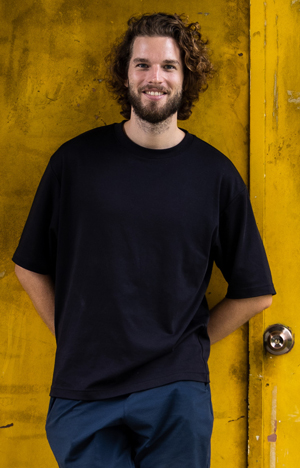
What did you do to fulfil your wish to live a Balinese lifestyle?
Jannik: First of all, I took every opportunity to discover new countries. During my master's studies, for example, I spent two semesters in Budapest. There, too, I realised that the feeling of belonging to a place can come from anywhere. These experiences showed me that I had to find a way to be free to work where, when, and how I wanted.
Digital solo-entrepreneurship was the ideal solution. After all, this form of entrepreneurship focuses on digital business models, diversified income streams and remote working. Which is precisely what I am passionate about.
What exactly does solopreneurship mean?
Jannick: In Germany, this concept is still quite new, but in the US, it is already very established. Digital solopreneurs combine their interests and skills as individual entrepreneurs to spend their 4,000 weeks on this planet as creatively as possible. The focus here is on independence in terms of time, place, and finances.
"As someone born in Germany, it feels like I won the lottery of life."
The difference between being a freelancer and a solopreneur is that solo-preneurs make their business scalable. I have been a solopreneur for six years now and I started as a freelancer. Working with my clients made me realise that I could sell not only my services, but also my own products.
In this regard, I have to say that I have already won the life lottery. I am incredibly grateful for my German passport and the high-quality education I received. And yet I see that in Germany it is not easy to start a business. Those who want to start a business in Germany are initially very discouraged by the many bureaucratic hurdles. Even standard forms from the tax office can be very intimidating because of their tone.
How did the people around you react to the news of your departure from Germany?
Jannick: There were a lot of different reactions. Some were sad, some were happy, some were confident that I would succeed. For my family and my closest friends, it wasn’t really a surprise. They had known for years that I wanted to work remotely. A lot of people were also confused when I told them where I would be moving. The place I moved to first was Tbilisi in Georgia, and only few people know the city and the country.
I chose Tbilisi at the time because it was in the top 10 destinations for digital nomads on Nomadlist. The cost of living in Georgia is relatively low, and the country is very advanced in terms of digitalisation. There are a lot of co-working spaces, the locals are very open, and the entry requirements are low.
Before I started my solopreneur business, I had a 'typical' working life. The type where you have to go to the office at least from nine to five for five consecutive days. At some point, I realised that this was not my thing. The main reason is that time is simply the most important resource we have in life: On average, we get 4,000 weeks on this planet. Knowing this really changed my perspective and it fascinated me.
Working hard is absolutely no problem for me. But I think that self-fulfilment and having a sense of purpose are what matter the most. Also, I believe that, because work is such a huge part of our lives, your private and professional life must necessarily come together. Work must generate enthusiasm.
What makes remote work so appealing?
Jannik: It’s the flexibility you have, the numerous new opportunities and possibilities you get, the interesting people you meet… It’s a whole lifestyle. It allows me to be completely independent. For me, being able to choose where you live and having homes all around the world is a real luxury. This way, I can really enjoy my 4,000 weeks as I see fit. I don’t want to postpone experiences and travels to the last third of my life, I want to do everything I want right now.
"We live in a world where conditions are changing faster than ever before."
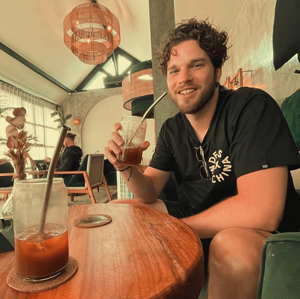 Bali, in a café in Canggu; © Jannik Voß - Solopreneur Studio
Bali, in a café in Canggu; © Jannik Voß - Solopreneur Studio
What does security - especially financial security - mean to you in contrast to freedom?
Jannik: For me, there is no contrast here. Security is an illusion. We live in a world in which the conditions are changing faster than ever before. Change has become completely normal. Anyone who doesn't keep reinventing themselves and taking advantage of digital opportunities is not competitive - and accordingly not "secure".
For me, financial security means freedom. Money is a means to an end. It serves as potential energy. Energy that should be used to realise one's own projects and to gather impressive experiences. A location-independent life as a digital solopreneur offers huge opportunities - because you can diversify your income and benefit from geo arbitrage.
What does Geo Arbitrage mean?
Jannik: The term comes fron the book "The 4-Hour Week" by Tim Ferriss. This book is to an extent the standard reading for remote entrepreneurs. In a sense, the author says, "You don't have to be a millionaire to live like a millionaire.". Basically, if you get your income in a strong currency and then take advantage of a country's cheap cost of living, you benefit from a higher quality of life.
"If you want to start a business in Germany, you have to have a high tolerance for pain."
How have you settled in in Bali and will this country be your base?
Jannik: I have arrived. I am learning the language, have made many new friends, and met a lot of interesting people. The open, relaxed culture simply has an enormously positive effect on my everyday life. Bali is my base. From here, I can travel to neighbouring countries like Malaysia or Thailand several times a year. But I also want to set up various "home bases" in Europe in the future - for example in Portugal, Italy, or Spain.
I still have many countries on my bucket list. Fortunately, I only need my laptop and good internet to work on my digital projects. So, I can decide spontaneously and flexibly where the journey will take me.
Was starting your own business challenging? And how did you overcome the challenges?
Jannik: Starting the business in itself was quite easy. However, many things that come afterwards are unnecessarily complicated and bureaucratic in Germany. If you want to start a business in Germany, you have to have a high tolerance for pain. It can be difficult to concentrate on the core business. Self-employed people and entrepreneurs in Germany are constantly being thrown bureaucratic obstacles in their path - so it's not surprising that creative founders change their direction in the long run.
In the Solopreneur Studio, I help people with digital self-realisation. I notice that the members of my community are often overwhelmed by the German formalities. In addition to brainstorming and evaluating the digital business model, there is always the added challenge of bureaucracy. For example, the fear of doing something wrong, tax issues, costs for a tax advisor and so on. All these things take up valuable time and energy. Without a philosophical approach, I probably wouldn't have lasted until today. I studied Stoicism a lot. That's how I learned to build resilience and drew the motivation I needed to keep going. In addition, spirituality helps me to clearly define my own path again and again. I am convinced that you have to approach problems in an interdisciplinary way to solve them in the best possible way.
Can you imagine returning to Germany?
Jannik: No. The lifestyle and opportunities abroad are simply much more attractive. Germany doesn't offer the necessary infrastructure that would allow me grow privately and professionally to the extent that I would like.
Can you imagine returning to Germany?
Jannik: No. The lifestyle and opportunities abroad are simply much more attractive. Germany doesn't offer the necessary infrastructure that would allow me grow privately and professionally to the extent that I would like.
"The more countries I travel to and the more cultures I get to know, the clearer it becomes to me that a cultural identity has a constricting effect and blocks the view of the versatility of this world."
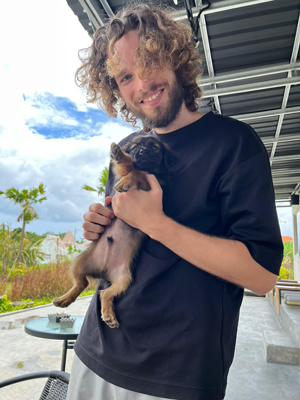 With Hundi in the Asha; © Jannik Voß - Solopreneur Studio
With Hundi in the Asha; © Jannik Voß - Solopreneur Studio
How would you situate your own cultural identity?
Jannik: I see myself as a citizen of the world. Every person, no matter in which country they were born, is an equal member of this world. Every culture offers exciting and valuable components. I want to immerse myself in as many cultures as possible. Our identity is built like an onion. At the core is the self. And around it are numerous layers. For example, the expectations of society, cultural conventions, expectations of friends and, of course, expectations of the self.
I think that a large part of one's "identity" is trained. And this is where travel comes in. Through travel, I can try out new versions of myself. And I can question values and norms that I previously took for granted. Sure, I still carry around a lot of stereotypical "German values". For example, punctuality or structure. But the more countries I travel to and the more cultures I get to know, the clearer it becomes to me that a cultural identity has a constricting effect and blocks the view of the diversity of this world.
Critics might of course now cry out and say that my worldview is utopian. And that's okay. I like to be egoistic about this and focus on what makes me happy. Because a positive view of the world and a realistic weighting of good and bad has a great influence on one's own well-being.
"I would introduce compulsory travel if I could - then people wouldn't develop so much xenophobia either."
Does the world feel more insecure for you because of the geopolitical crises?
Jannik: I used to consume a lot of news. But gradually I realised that this excessive consumption was distorting my view of the world. Today, I prefer to spend some time in a country myself to form my own opinion. I believe that the focus on "bad news" and the alarmism that is so omnipresent today quickly leads to a negative spiral - and that in turn distorts the view of the whole picture.
My personal impression is that the Western world, i.e. above all Europe and the USA, often allow a certain arrogance to resonate when looking at and judging other nations. Tolerance, empathy and a global perspective would do the world good. There is no one way to change the world for the better.
Travelling makes so many things clearer. If I could, I would introduce compulsory travel in Germany - then people wouldn't develop so much xenophobia. My world view is positive, and I want to keep it that way.
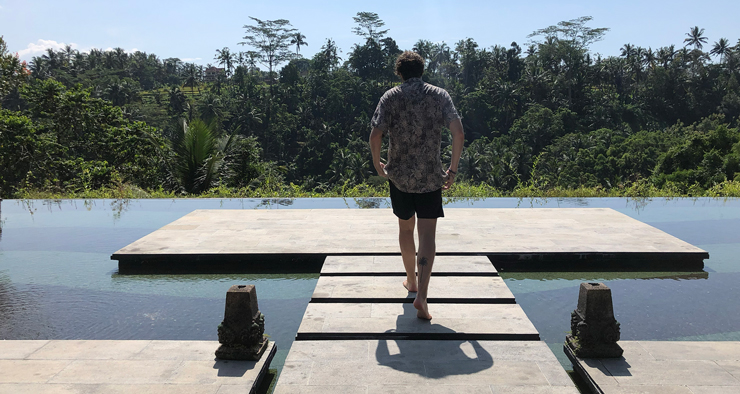 Bali, in Ubud; © Jannik Voß - Solopreneur Studio
Bali, in Ubud; © Jannik Voß - Solopreneur Studio

